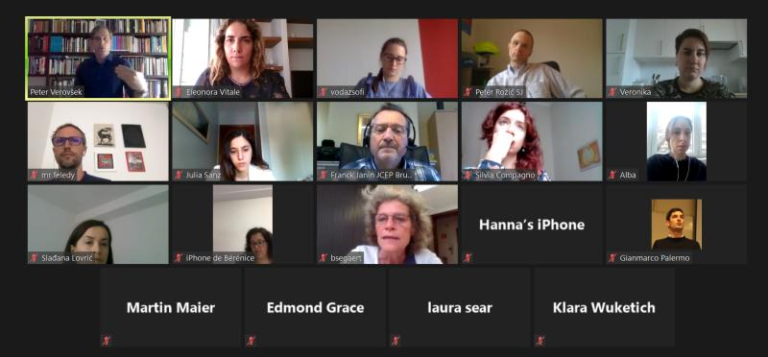
There is a new east-west division in Europe related to different understandings of democracy. On the 5th of June, Peter Verovšek, a researcher at the University of Sheffield, provided the JESC team some approaches to better understand how the collective memory helps make sense of current affairs events out of the different conception of democracy.
His main argument was that collective memory crucially influences the way we construct narratives based on a past to further set goals for the future. It is important to consider the role of the past shaping how societies conceive in the present social, economic, and political factors so as to understand how it is affecting their ordinary lives. For example, in the way politicians design the school curricula or decide on the removal of historic monuments commemorating a nation’s past and set the cultural agenda.
Professor Verovšek explained the clash of memory culture that arose after 1945 and 1989. After the painful experience of Soviet domination, Eastern sensitivity rejected any external imposition as well as any constitutional constraints which changed what people understood by the nation. This way, Eastern states would focus their efforts on resisting to past experiences of totalitarianism whilst Western states would focus on the safeguard of Human Rights and the protection of the rights of minorities.
This explains why Eastern populations accumulated easy support for national democracy being defined by the nation, a republican conception based on the consent of the people and the liberal protection of rights rather than a majoritarian democracy. As a result of these differences, the East and the West European states held different anti or pro Europe stances, although he remarked this depends on what each one’s view of Europe is. The different socially constructed perspectives on Europe and European policies are manifested, for instance in the rejection or welcoming of refugees and asylum seekers. According to him, the goal should be to reconcile the idea of what a unified Europe means.
The speaker closed his lecture by reflecting back in history on the Western European concept of the nation-state. Since the Enlightenment, Western Europe had experienced exponential growth and social, economic, and political advancements which led governments to assert that only a democratic country can guarantee progressive development. This raised the question on the Western criteria for a developed state: “are African states really failing as states or we are imposing that they are failing because of our conception of the state?” he asked. This question is also to be taken into account in a number of fields such as international development cooperation for better practices.
After a lively discussion on the importance of cultural factors shaping concepts such as Nation-State and democracy, we concluded that it is key to acknowledge the role of collective memory in gaining support in Eastern and Western Europe for common European policies and an integrated Europe.
Review by Julia Sanz
JESC Summer intern

